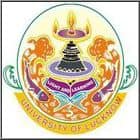Fees Details
₹ 20.00 K
Course Details
The online MA in Sanskrit programme at the University of Lucknow is designed to equip students with a comprehensive understanding of Vedic literature, Vedanga, and classical Sanskrit texts. The programme curriculum covers important hymns from Rig Veda, Sama Veda, and Atharva Veda while focusing on Vedic grammar, etymology, and the history of Sanskrit literature.
With an online MA in Sanskrit at the University of Lucknow, students gain knowledge of traditional Indian philosophies such as Advaita and Vishishta advait darshan, along with techniques for manuscript preservation and analysis of ancient scripts. The programme integrates both theoretical and practical approaches to classical Sanskrit, empowering students to pursue research, teaching, and cultural preservation.
Programme Offerings
- UGC-entitled online degree
- Robust curriculum
- Credit-based courses
- Electives
- video lectures
- Flexible learning
- Summer internship
- Master thesis
- Viva-Voce
Eligibility Criteria
To be eligible for the online MA Sanskrit programme at the University of Lucknow, candidates must have completed a Bachelor’s degree from a recognised university. Students who have studied Sanskrit in at least one year of their undergraduate course must have secured a minimum of 45 percent aggregate marks.
If Sanskrit was not studied during the undergraduate programme, candidates are required to have at least 50 percent aggregate marks.
Admission Details
Candidates can apply for admission to the University of Lucknow Online MA in Sanskrit programme by submitting the registration form and the requisite registration fees. Admissions are done based on previous academic performance.
Application Details
Applicants must follow all the instructions to apply for admission to the online MA in Sanskrit at the University of Lucknow:
Visit the official website - luonlineeducation.in
Register using a valid email ID and mobile number
Fill in personal, academic, and contact details
Upload the required documents
Pay the applicable registration fees
The Syllabus
The online MA in Sanskrit syllabus spans four semesters over two years. The curriculum covers core courses and electives. There is a summer internship in the third semester and a master thesis in the fourth semester. Here is the detail syllabus of the University of Lucknow Online MA Sanskrit programme:
Vedo Vedvangayanch
Kavyam Kavyashashtrananch
Tarkbhasha
Bhashavigyanam Vyakarananch
Palisahitayam
Sanskritam Vigyananch (Value added course (Credited)
Vedo Vaidici Sanskritisch
Kavyam Kavyaprakshasch
Sankhyatatvakoamudi
Vyakranam Mahabhashyasch
Prakritisahityam
Dharmshashtriyadhayyanam
Group A: Ved Varg
Shriksanhita Bhashyabhumika ch
Shiksha Grihsutranch
Niruktam Pratishakhyanch
Apthitamshonuvasch
Brahmanam Mimansa ch
Katyayanshrotsutram
Pustkalaysarvekshanam (Summer Internship)
Vaidicvangyasyetihasaha
Group B: Sahitya Varg
Kavyalankarshashtram
Natyashastram Natakanch
Rassidhanto Bharatiyasaundaryashastranch
Apthitamshonuvasch
Pashchatyasaundaryashastram
Aetihasikamahakavyam Abhilekhashch
Pustkalaysarvekshanam (Summer Internship)
Matrikavigyanam
Group A: Ved Varg
Rigved Rigvedbhashayabhumika c
Elective Courses
Shiksha Kalpshastranch
Sanskarpadhatih
Niruktam Pratishakhyanch
Mimansashastram
Laghushodhprabandhah (Master Thesis)
Puralipirbhilekhgyanam
Group B: Sahitya Varg
Kavyashastramimansa
Elective Courses
Rasgangadharah
Adhuniksanskritsahityetihasam
Adhuniksanskritkavyam Kavyashastranch
Natyashastramimansa
Laghusodhprabandhah (Master Thesis)
Puralipirbhilekhgyanam
Evaluation Process
Examinations for the Online MA in Sanskrit programme at the University of Lucknow are conducted in offline mode at university campus. Students are required to visit the campus only once in each semester to appear for the end-semester examinations.
Lucknow University Frequently Asked Questions (FAQ's)
Candidates with a Bachelor’s degree from a recognised university with the required percentage can apply for an online MA in Sanskrit at the University of Lucknow.
Yes, the online mode of the programme allows flexibility to study alongside jobs or other commitments.
The University of Lucknow Online MA in Sanskrit is a two-year programme, divided into four semesters.
Candidates can apply online through the university website by filling out the application form and paying the registration fee.
Graduates can work in teaching, research, manuscript preservation, and cultural organisations.
